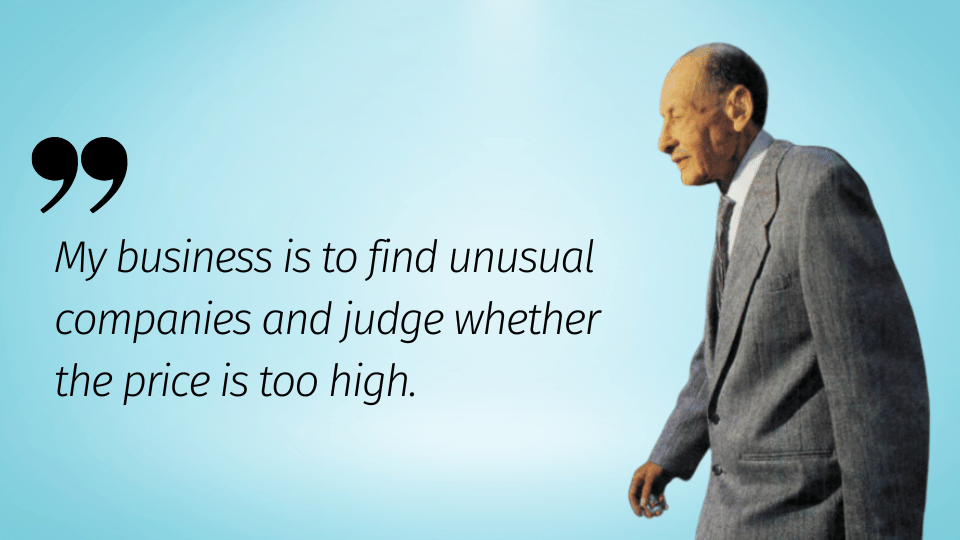Dette er et intervju av den legendariske investoren Philip A. Fisher fra 23. September 1996.
Skrevet av James W. Michaels for Forbes.
Philip Fisher er forfatteren av boken Common Stocks and Uncommon Profits, som mange anseer å være en investeringsklassiker.
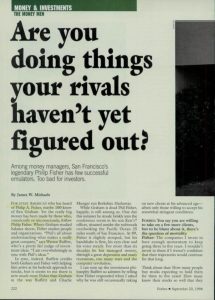
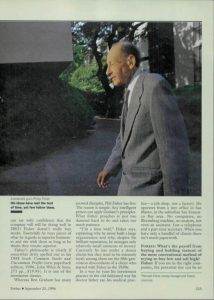
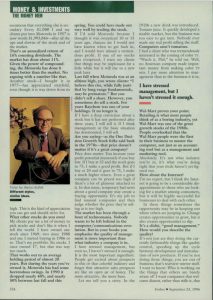
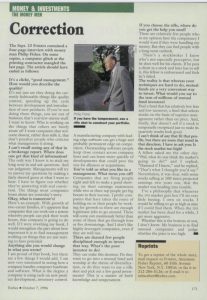
Are you doing things your rivals haven’t yet figured out?
Among money managers, San Francisco’s legendary Philip Fisher has few successful emulators. Too bad for investors.
By James W. Michaels
FOR EVERY AMERICAN who has heard of Philip A. Fisher, maybe 100 know of Ben Graham. Yet the really big money has been made by those who, consciously or unconsciously, follow Philip Fisher. Where Graham studied balance sheets, Fisher studies people and organizations. “Phil’s all about understanding what makes a really great company,” says Warren Buffett, who’s a pretty fair judge of investment ideas. “I am overwhelmingly in sync with Phil’s ideas.”
In sync, indeed. Buffett credits both Graham and Fisher with helping him arrive at his bedrock approach to stocks, but it seems to me there is now much more Fisher than Graham in the way Buffett and Charlie Munger run Berkshire Hathaway.
While Graham is dead Phil Fisher, happily, is still among us. One day this summer he strode briskly into the conference room in his son Ken’s* offices, situated amidst the redwoods overlooking the Pacific Ocean 25 miles south of San Francisco. At 89, Fisher is slightly stooped, but his handshake is firm, his eyes clear and his voice steady.
For more than six decades he has managed money, through a great depression and many recessions, too many wars and the computer revolution.
I can sum up the investment philosophy Buffett so admires by telling how Fisher responded when I asked why he was still occasionally taking on new clients at his advanced age – albeit only those willing to accept his somewhat stringent conditions.
FORBES: You say you are willing to take on a few more clients, but to be blunt about it, there’s the question of mortality.
Fisher: The companies I invest in have enough momentum to keep going three to five years. I wouldn’t invest in them if I weren’t confident that their trajectories would continue for that long.
Think about that: How many people buy stocks expecting to hold them for three to five years? How many know their stocks so well that they can say with confidence that the company will still be doing well in 2001? Fisher doesn’t really buy stocks. Essentially, he buys pieces of what he regards as superior business es and sits with them as long as he thinks they remain superior.
Fisher’s philosophy is clearly if somewhat dryly spelled out in his 1958 book Common Stocks and Uncommon Profits. It is one of the investment classics.
Whereas Ben Graham has many avowed disciples, Phil Fisher has few. The reason is simple: Any intelligent person can apply Graham’s principles. What Fisher preaches is just too damned hard to do and takes too much patience.
“I’m a lone wolf,” Fisher says, explaining why he never built a large organization and why, despite his brilliant reputation, he manages only relatively small amounts of money. Currently he has under a dozen clients, but they tend to be intensely loyal; among them are the fifth-generation descendants of a client who started with Fisher in the 1930s.
In a way he runs his investment practice in the old-fashioned way his doctor father ran his medical practice – a job shop, not a factory. He operates from a tiny office in San Mateo, in the suburban San Francisco Bay area. No computers, no Bloomberg machine, no analysts, not even an assistant. Just a telephone and a part-time secretary. When you have only a handful of clients there isn’t much paperwork.
FORBES: What’s the payoff from buying and holding instead of the more conventional method of trying to buy low and sell high?
Fisher: If you are in the right companies, the potential rise can be so enormous that everything else is secondary. Every $1,000 I and my clients put into Motorola in 1957 is now worth $1,993,846-after all the ups and downs of the stock and of the market.
That’s an annualized return of 16% counting dividends. The market has done about 11%. Given the power of compounding, the Motorola has done 6 times better than the market. No arguing with a number like that.
Fisher: Another stock – I bought it in 1977 – has appreciated sixtyfold, even though is way down from its high. This is the kind of appreciation you can get and should strive for.
What other stocks do you own?
Fisher: My clients pay me a lot of money to pick stocks and don’t like it when I tell the world. I have owned one stock since 1969, two since 1988 and one I started buying in 1986 or so. That’s my portfolio. Six stocks. I once owned 17, but that was way too much.
That works out to an average holding period of almost 20 years. But during the years you’ve owned it, Motorola has had some horrendous swings. In 1990 it dropped nearly 40%, and nearly 50% between last fall and this spring. You could have made out very well by trading the stock.
Fisher: If I’d sold Motorola because I thought it was overpriced 10 or 15 years ago, chances are I would not have known when to get back in, and I would have missed a tremendous profit. If one of my stocks gets overpriced, I warn my clients that things may be unpleasant for a little while, but it will rise to a new peak later.
Last fall when Motorola was at an alltime high, you wrote clients: “I believe this rise, while fully justified by long-range fundamentals, may be premature.” But you didn’t sell a share. However, you sometimes do sell a stock. For years Raychem was one of your holdings. It no longer is.
Fisher: If I have a deep conviction about a stock but it has not performed after three years, I will sell it. If I think management or the basic situation has deteriorated, I will sell.
Are you saying – as the One Decision Growth Stock folks said back in the 1970s – that price doesn’t matter if it’s a great company?
Fisher: Price does matter. You increase your profit potential immensely if you buy low. If I buy at 32 and the stock goes to 75, I make a good profit. But if I buy at 20 and it goes to 75, I make a much higher return. Even a great company can be priced too high if there’s a lot of glamour attached to it. In that sense, temporary bad news about a good company may create a buying opportunity. It’s my job to find unusual companies and then judge whether the price they’re selling at is too high.
The market has been through a bout of technomania. Nobody wants to be left behind in the computer/communications revolution. But in your books you emphasize the quality of management is more important than what industry a company is in.
Fisher: I have stressed management, but even so, I haven’t stressed it enough. It is the most important ingredient. People get excited about prospects in this or that colorful industry and forget that attractive sales prospects are like an open jar of honey. The more attractive, the more bees.
Fisher: Let me tell you a story. In the1920s a new drink was introduced. Tomato juice. It quickly developed a sizable market, but the business was too easy to get into. Nobody ever made any real profit selling the stuff.
Computers aren’t tomatoes.
Fisher: I had a client who was tremendously interested in the coming of color TV. “Watch it, Phil,” he told me. Well, no American company made important money from making color TV sets. I pay more attention to management than to the business it is in.
Wal-Mart proves your point. Retailing is what most people think of as a boring industry, yet Wal-Mart was one of the great growth stocks of the 1980s. People overlooked that the Wal-Mart people were the first in their business to master the computer, not just as an account- ing tool but as a management and marketing tool.
Fisher: Absolutely. It’s not what industry you’re in, it’s what you’re doing right that your rivals haven’t yet figured out.
How about the Internet?
Fisher: I’m no expert, but I think the Internet is going to be a considerable disappointment to those who are looking for a market among consumers, but it will be highly successful for businesses to deal with each other.
Fisher: In these things sometimes, the opportunity may be in keeping out where others are jumping in. Change creates opportunities to grow, but it also creates opportunities to slip.
It’s a cliché, “good management.” How would you describe the quality?
Fisher: It’s not just are they doing the currently fashionable things like quality control, speeding up the cycle between development and introduction of new products. If you’re not doing those things, you are out of business; that’s rearview-mirror stuff. I want to know: Who is working on the things that others are barely aware of? I want companies that welcome dissent (Dissens: mening som skiller seg fra flertallets), rather than stifle it, that don’t penalize people who criticize what management is doing.
I can’t recall seeing any of that in a brokerage report. Where does one get that kind of information?
Fisher: The only way I know is to stick my long nose in and ask questions. And use judgment. Managements will try to answer my questions by making a fairly shrewd guess at what I want to hear. I have to figure out whether they’re answering with real convic-tion. The things most companies boast about are yesterday’s story.
Okay, what is tomorrow’s?
Fisher: Here’s an example. With growth of two-earner families, it’s apparent that companies that can work out a system whereby people can pick their work hours, that company is going to do well. If I were rewriting my book, I would strengthen the part about how important it is to find management working on things that are just starting to have potential.
Anything else you would change in what you wrote?
Fisher: I am proud of that book, but there are a few things I would add. I am now very interested in seeing how a company handles computer hardware and software. What is the degree a company is using each on new product development, inventory control.
Fisher: A manufacturing company with leading edge software can get a huge and probably permanent edge on competition. Outstanding software people keep close contact across company lines and can learn more quickly of developments that could pave the way for alliances or acquisitions.
You’ve told us what you like in a management. What turns you off?
Fisher: Companies that are firing people right and left to make a good showing on their earnings statements while two or three top people get big boosts in their income. I prefer companies that have taken the route of holding on to their people by working for growth so there are enough legitimate jobs to go around. These will come out enormously better than some of those that go through four or five downsizings. And I don’t like highly leveraged companies, even if they are well run.
There are darned few people disciplined enough to invest that way. What’s the poor investor to do?
Fisher: They can make this decision: Do they want to go into a mutual fund and worship at the shrine of diversification, or do they want to use a rifle shot and pick out a few good investments? This is a matter of both knowledge and temperament.
If you choose the rifle, where do you get the help you need?
Fisher: There are relatively few people who in my opinion have the competency I would want if they were handling my money. But they can find people with a long-term outlook.
Fisher: There’s a stockbroker I know who’s not especially perceptive, but he does well for his clients. If he puts a client in a stock and later has to sell it, this fellow is embarrassed and feels he’s failed.
The reality is that whereas your techniques are hard to do, mutual funds are a very convenient way to invest. What would you say to the tens of millions of mutual fund investors?
Fisher: Find a fund that has relatively low fees and low turnover, a fund that selects stocks on the basis of superior management rather than on price. And, finally, that doesn’t sell if a stock is temporarily overpriced just to make its quarterly results look good.
I can’t think of any that fit that profile, but there are some that trend in that direction. I have to ask you: Is the stock market too high?
Fisher: A fellow asked me the other day: “Phil, what do you think the market’s going to do?” and I replied, “Damned if I know,” and he replied, “That’s what I thought you’d say.” Nevertheless, it was clear, with some stocks selling at 100 times projected earnings two years out, that the market was heading into trouble.
Fisher: I’ve a philosophy that whenever the IPO market gets hot I’ll do very little buying. I own six stocks. I would be willing to go as high as nine if I could find them. When the IPO market has been dead for a while, I get more aggressive.
Fisher: Whether this is the bottom or not, I don’t know. My business is to find unusual companies and judge whether the price is too high.

Velkomsttilbud
Er Nordnet Norges beste plattform for investering?
Handle aksjer fra 1 krone (0,035 %) på de nordiske børsene.
Velg mellom over 850 fond og over 1800 ETFer.
Annonselenke. Investering er risikabelt.

